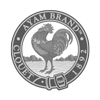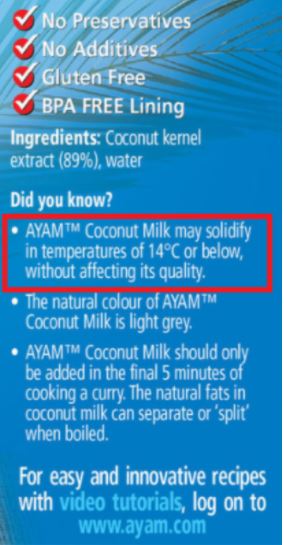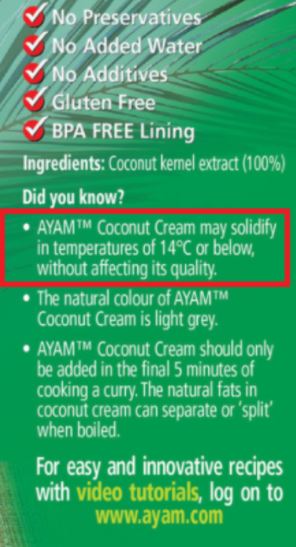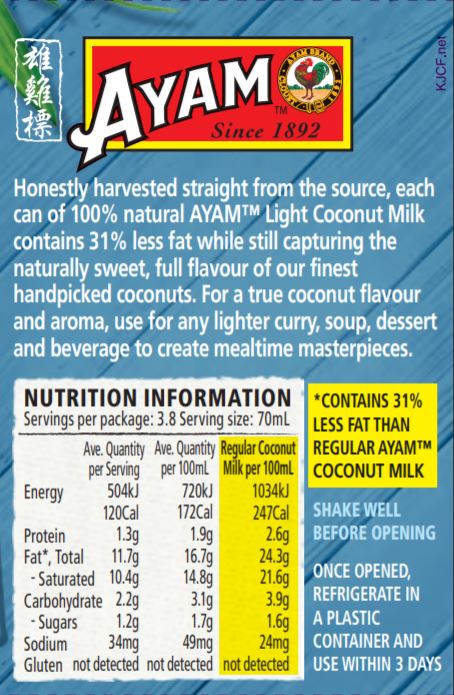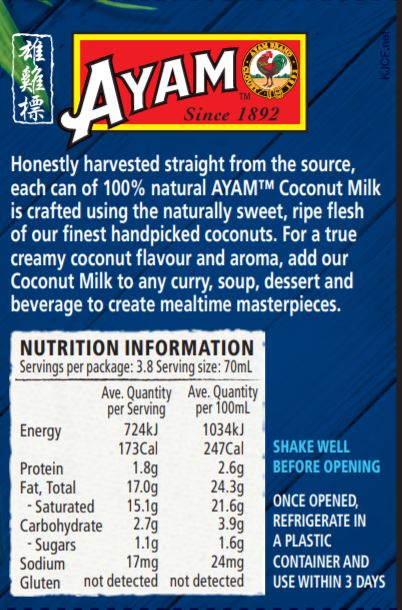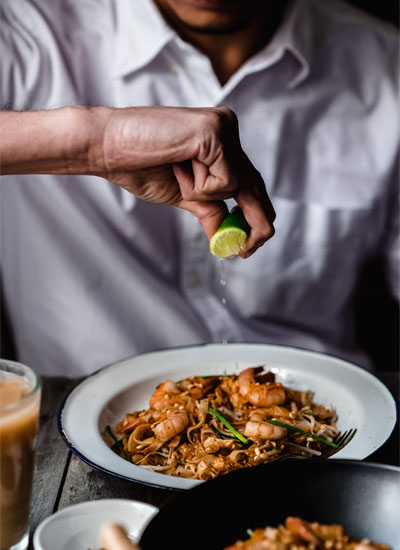About Our Brand
Certification
AYAM™ products are manufactured in state-of-the-art facilities that meet the highest international standards with worldwide-recognized certifications.
Australian Certified Organic: an Australian Government approved certification mark. ACO is one of the most respected and rigorous standards in the world for organic production, and is published by organic industry not-for-profit representative group, Australian Organic.
Coeliac Australia: The Coeliac Australia Endorsement Program, utilising the Crossed Grain Logo, is a trademark owned and administered by Coeliac Australia under a licence agreement. The symbol of the crossed grain in a circle is both nationally and internationally recognised by those who need to follow a gluten free diet.
HACCP MS 1480:2007: The optimum system of preventive controls and most effective process to protect against food contamination.
ISO 9001: 2008 QMS: A quality management system to deliver a consistent top quality to consumers.
Halal MS 1500:2009: strict supervision and certification from JAKIM Malaysia.
Reduce Reuse Recycle
AYAM™ value our resources and environment, and believe that the whole product should be used in the process to limit waste. As part of this commitment, we are engaged in a long term production program to reduce waste and carbon footprint.
For our coconut range: our factory process the whole coconut (water, oil, milk and cream) and the only waste, the coconut shell, is collected and used for the burners to replace usual fossil energy, such as oil or gas.
In the case of our fish factory, we are working on special machinery that will process the rejects to produce Fish Hydrolyzed Protein for the pharmaceutical industry. We minimize packaging and work mostly with simple packaging material like tin, glass or paper, which are 100% recyclable.
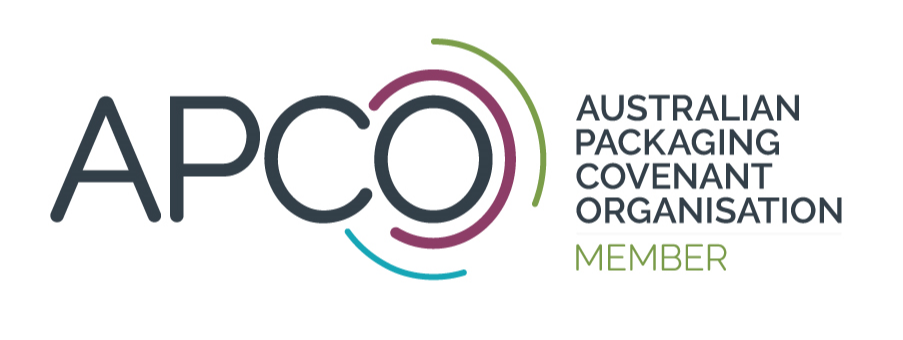
The Australian Packaging Covenant (the Covenant) is a national regulatory framework under the National Environment Protection (Used Packaging Materials) Measure 2011 (NEPM) that sets out how governments and business across Australia share the responsibility for managing the environmental impacts of packaging.
A. Clouet Pty Ltd has been a proud APCO signatory since 2010. As members, we complete an annual Action Plan and Report, which helps to keep us accountable for improving our packaging sustainability every year. We are committed to implementing the Australasian Recycling Label (ARL) onto AYAM™ packaging to reduce confusion about recycling. The initiative provides clear information to consumers on how to recycle each component of the packaging.
Coconut
Why has my Coconut Milk/Cream solidified or curdled?
Being a 100% natural product, our Coconut Milk / Creams have a low solidifying temperature of around 14°C, if the temperature falls below this the contents may solidify.
Sometimes in cold weather, even when kept in a pantry our Coconut Milk/Cream may solidify or curdle.
To regain the liquid aspect, simply heat up in a pan, sit the can in a bowl of hot water or directly spoon into your food and stir well.
Why is the coconut milk/cream not plain white in colour?
Coconut Milk/Creams are not always plain white but can have a slightly grey shade, which can be corrected by adding chemical whitening agents.
Being 100% natural and free from whiteners, AYAM™ Coconut Milk and Cream may have a slightly off-white colour.
Why is the coconut milk/cream not plain white in colour?
Being a 100% natural product free from preservatives and additives, AYAM™ Coconut Milk/Creams might separate at a temperature of 14°C or below.
To regain the liquid aspect, ensure the product is shaken well before opening, otherwise, simply heat up the Coconut Milk/Cream in a pan, sit the can in a bowl of hot water, or directly spoon into your food and stir well.
What is the difference between Coconut Milk and Cream?
Both 100% natural regular Coconut Milk/Creams are made using Coconut Kernel Extract.
Our Coconut Milk is lighter in texture and contains water while our Coconut Cream is made from 100% Coconut Kernel Extract.
How should I store Coconut Milk/Cream?
Our Coconut Milk/Creams are best stored in a pantry, or a dark cool area out of the sun.
Can I freeze Coconut milk/Cream?
We do not recommend freezing the Coconut Milk/Cream as lower temperatures will change and affect the product’s physical characteristics and cause oil separation.
Why is your Coconut Milk Powder not dairy free?
Our Coconut Milk Powder is the only product in our coconut range which contains milk protein and is therefore not dairy-free.
The milk protein ingredient is sodium caseinate which is found in cow’s milk and is used as a stabiliser to help the powder and water bind together and blend properly so the powder doesn’t float to the surface.
The protein acts as an essential binding ingredient for our Coconut Milk Powder product hence we are unable to remove or substitute this ingredient at this stage.
What is the difference between your organic and regular coconut milk/creams?
Our regular coconut range is manufactured in Malaysia from locally sourced coconut plantations whereas, our organic Coconut product range is grown and sourced from organic plantations in Thailand.
Both AYAM™ regular and organic Coconut Milk/Creams are 100% natural and contain no preservatives or whiteners. Our organic Coconut Milk/Creams do contain a natural vegetable guar gum, used as a thickener due to the coconut’s lower fat levels.
As the dilution process can cause separation of the emulsified liquid, a vegetable guar gum is required to maintain the consistency of our organic Coconut Milk/Cream.
What is the difference between light and the regular coconut milk/cream?
Our Light Coconut Milk contains 31% less fat compared to regular AYAM™ Coconut Milk, while our Light Coconut Cream contains 26% less fat compared to regular AYAM™ Coconut Cream.
For your convenience, we have listed the nutritional information of regular AYAM™ Coconut Milk/Cream (in the furthest column) to compare against AYAM™ Light Coconut Milk/Cream (second column) on the label of our Light Coconut Milk/Creams.
Does AYAM™ use monkeys when harvesting coconut?
At AYAM™, we stand firmly against exploiting monkeys for harvesting coconuts.
Our plantations are regularly visited and audited by our Quality Assurance team to overlook coconut quality and the harvesting process.
We confirm our coconuts are manually removed by skilled local workers. These workers will use long handle hook knives as well as ladders to climb up and remove coconuts from trees.
We share you concerns for the welfare of animals in coconut plantations and do not engage in these behaviours from occurring in our supply chain.
Coconut shortages and rising prices
The coconut industry is currently facing significant global disruptions and supply shortages with major coconut-producing countries affected by adverse conditions (weather and logistics) negatively impacting coconut yields. With strong global demand, price are now historically high.
This is undoubtedly one of the most challenging periods the coconut industry has ever faced.
AYAM™ is committed to providing the highest quality 100% natural coconut product range crafted using the naturally sweet, ripe flesh of our finest hand-picked coconuts.
We trust you will continue to remain a loyal and valued customer of our products.
Meal Pastes
Which of your pastes are suitable for vegans?
Click Here to view our full Vegan product range.
Can I freeze AYAM™ Meal Pastes?
We do not recommend freezing AYAM™ meal pastes.
Should you choose to do so, thaw and then defrost before consuming.
How long can I keep an opened AYAM™ Meal Paste jar?
We recommend storing our meal pastes in a refrigerator and consuming within 1-month of opening.
Should you choose to store it longer than a month, we would recommend using your judgment to determine whether the paste is safe for consumption - checking for any signs of spoilage i.e. different or unusual smells, texture, separation or changes in colour.
We recommend discarding the jar and any remaining contents after it’s passed its use-by date.
Asian Sauces
How long can I keep an opened Asian Sauce bottle?
We recommend storing our Asian Sauces in a refrigerator and consuming within 1 month of opening.
Should you choose to store it longer than a month, we would recommend using your judgment to determine whether the paste is safe for consumption - checking for any signs of spoilage i.e. different or unusual smells, texture, separation or changes in colour.
We recommended discarding the bottle and any remaining contents after it is past its use-by date.
Which of your Asian Sauces are suitable for vegans?
Click Here to view our Vegan products.
Is the ‘oyster flavour’ in your Vegetarian Oyster Sauce vegan?
Our Vegetarian Oyster Sauce is not made from any shellfish ingredients, the ‘oyster flavour’ is plant-based.
Due to manufacturing methods, our Vegetarian Oyster Sauce may still contain traces of fish and molluscs, hence, ‘shell-fish free’ is not marked on the label.
According to Vegan Australia or the Vegan Society, Vegan Australia Certified products;
“Have no animal ingredients deliberately added to them. However, many vegan products are made on shared machinery and so there is a risk of cross contamination with non-vegan ingredients. To certify their products, manufacturers must show they take reasonable steps to minimise cross contamination. If potential allergens cross contamination is an issue for you, please check with the manufacturer.”
Our Allergen/Diet Friendly Products
Which AYAM™ products are Paleo diet friendly?
Click Here to view a comprehensive allergen and dietary guide to our product range.
NB: This is a list of products that are either organic, pure or natural with fewer processes and with less/no additive ingredients.
Please use your discretion when deciding whether or not these products are suitable for your diet.
Which AYAM™ products are gluten free?
Click Here to view a comprehensive allergen and dietary guide to our product range.
Which AYAM™ products are Vegan friendly?
Click Here to view a comprehensive allergen and dietary guide to our product range.
Do your Satay Sauces contain nuts?
All AYAM™ Satay, Thai Satay and Gado Gado peanut sauces contain peanuts. For a nut-free satay, try AYAM™ Satay Seasoning.
Click Here to view a comprehensive allergen and dietary guide to our product range.
Where do I find comprehensive Allergen/Dietary information for your product range?
You can find a comprehensive guide to our full product range on our website:
About Our Quality
Genetically Modified (GM) Ingredients
All AYAM™ products do not contain any GM ingredients (Non-GMO).
Without any additives, how is the product quality maintained?
Our products are unique that we do not use additives such as stabilizers and emulsifiers to stabilize our products because of our unique processing method. This is also the reason why we mention on our labels that some natural separation can occur and one should shake the can rigorously before opening.
Is Ayam™ Tuna Sustainable?
AYAM™ only uses tuna species, which are not endangered & from biomass that is healthy (not overfished).
Does AYAM™ use sustainable palm oil?
AYAM™ has, for many years, implemented a responsible policy for the use of palm oil, by replacing it, wherever technically possible with alternative vegetable oils with a healthier nutrient profile. For the few AYAM™ products still using sustainable palm oil, AYAM™ sources in priority segregated certified sustainable palm oil. When it is not available, AYAM™ contributes to RSPO palm oil credit to reach our commitment of 100% sustainable palm oil.


